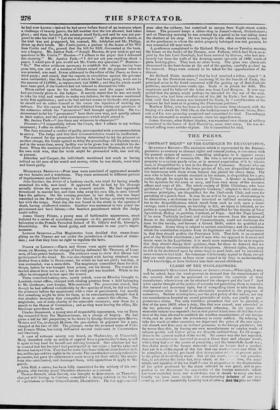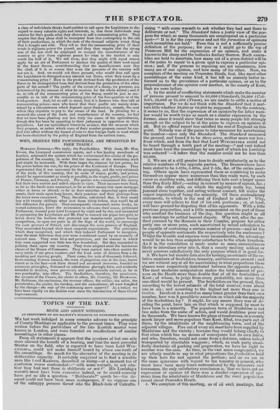CLAIMS OF THE WOOL-GROWERS.
BLACKWOOD'S QUARTERLY JOURNAL OF AGRICULTURE—What right, it may well be asked, have the wool-growers to demand that the manufacturers of the country shall not be permitted to procure the materials of their manufacture, where these can be obtained the cheapest and the best ? And what can be thought of the justice of not only not permitting them to exercise this natural and necessary right, but of compelling them to take from the wool-growers what is found to be absolutely unsuited to the purposes of commerce. Neither existing laws, nor the past policy of this nation, nor any one consideration founded on sound principles of trade, can justify so pre- posterous a claim. The only worthless precedent that can be pleaded, is that of the year 1819, when a duty, like that now craved, was conceded to the too pressing claims of Parliamentary influence. In six years this miserable statute was repealed ; but in that period it had done all that the short- ness of the time allowed to establish the woollen manufactures of our foreign rivals, and to give them the ascendency in every mArket. By refusing to take the wools of other countries, we depressed the price of the raw mate- rial abroad, and thus gave an indirect premium to the foreign producer; but far worse than this, by forcing our own manufacturers to etnploy wools of inferior quality acid higher price, we directly unfitted them for all compe- tition in the general market of the womb]. No sooner was this law repealed, than our manufacturers hastened to employ those finer and cheaper wool, which they had new the means of procuring ; and the immediate result was, that cloths made of the former materials could no longer find a market. And vet it is of the repeal of this law that our wool-growers now think fit to complain, as having produced that depreciation which at present exists in the price of the clothing wools. But do the wool-si ate (Ts not perceive, that, in admitting this latter fact, they admit, at the e. e.- time, the mag- nitude and injustice of the tax itself ?—for in proportion as the depreciation of the price produced by the cause referred to was great, and in pro- portion as we discovered the superiority of the foreign materials, which had been excluded from our workshops, was it shown to every one how heavily we have been taxing the manufacturing industry of our own countty, and how bountifully festering that of others. Awl thy plea on which a class of individuals thinks itself entitled to call upon the Legislature to dis- regard so many valuable rights and interests, is, that these individuals may receive for their goods what they choose to call a remunerating price. They require that they alone shall be exempted from that contingency in the sale of their productions, to which the state of the demand subjects every thing that is bought and sold. They tell us that the remunerating price of their wools is eighteen pence the pound, and they thus require that the strong arm of the law shall be employed to compel the manufacturers of the country to give them eighteen pence for what in the market is only worth the half of it, We tell them, that they might with equal reason apply for an act of Parliament to declare the quality of their wool equal to the finest Saxon, notwithstanding that the manufacturers aver that the cloth of it is so coarse that even the peasants of the country will not use it. And, we would ask these persons, who would thus call upon the Legislature to disregard every interest but theirs, what they mean by a remunerating price ? How is the profit derived from the production of the fleece to he distinguished from that derived from the production of the other parts of the ? The profits of the owner of a sheep, we presume, are determined by the amount of what he receives for the whole animal ; and if so, to talk of the remunerating price of the fleece, would be just as rea- sonable as to talk of the remunerating price of the fore-quarters or of the hind-quarters. And, let us call to mind, that it is farmers who thus talk of remunerating prices—men who know that their profits are mainly deter- mined by a circumstance which depends upon themselves, namely, the rent which they stipulate to pay to the owner of the land. In pleading for a moment the cause of the trade and manufactures of the country, we feel that we have been pleading not less truly the cause of the agriculturists, though this has been by appealing to their judgment in opposition to their prejudices. Let our agricultural friends be assured, that the measure which they propose, or rather which some of their number propose, cannot be car- ried into effect without the hazard of ruin to that foreign trade in wool which has been cherished by the policy of England from the earliest times.



















 Previous page
Previous page